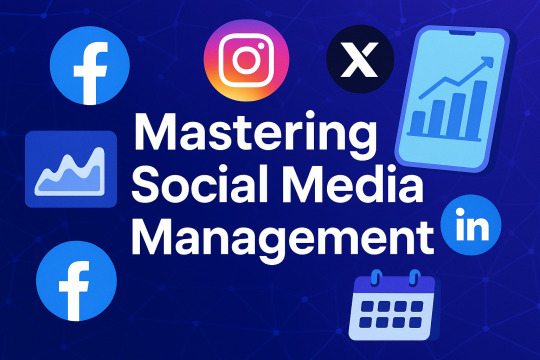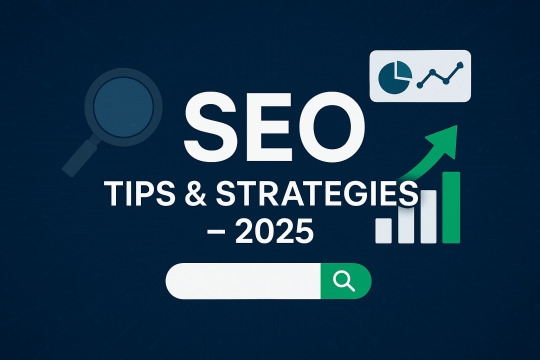Don't wanna be here? Send us removal request.
Text
Data Analytics with AI in 2025: Trends, Impact & What’s Next

As we move deeper into 2025, the fusion of Artificial Intelligence (AI) and data analytics has become more than a competitive edge—it's a business necessity. Companies that once viewed AI as experimental are now embedding it into the core of their operations, using it to transform raw data into real-time insights, accurate forecasts, and automated decisions.
In this post, we’ll explore how AI-powered data analytics is evolving in 2025, what trends are shaping the future, and how your organization can harness its full potential.
What Is AI-Driven Data Analytics?
AI-driven data analytics uses intelligent algorithms—such as machine learning (ML), deep learning, and natural language processing—to discover hidden patterns, predict future trends, and automate insights from vast and complex datasets.
Unlike traditional analytics, AI doesn’t just report on what happened; it explains why it happened and suggests what to do next—with unprecedented speed and precision.
Key Trends in 2025
1. Real-Time AI Analytics
Thanks to edge computing and faster cloud processing, AI analytics is now happening in real time. Businesses can react to customer behavior, supply chain issues, and financial trends instantly.
2. AI + Business Intelligence Platforms
Modern BI tools like Tableau, Power BI, and Looker now offer built-in AI features—from auto-generated visual insights to natural language queries (e.g., “Why did sales drop in Q1?”).
3. Predictive + Prescriptive Analytics
AI doesn’t just forecast future outcomes—it now recommends specific actions. For instance, AI can predict customer churn and suggest retention campaigns tailored to individual users.
4. Natural Language Insights
Non-technical users can now interact with data using plain English. Think: “Show me the top 5 products by revenue in the last 90 days.”
5. Ethical AI and Data Governance
With growing concerns about bias and data privacy, 2025 emphasizes explainable AI and strong data governance policies to ensure compliance and transparency.
Use Cases by Industry
Retail & E-commerce: Personalized shopping experiences, dynamic pricing, demand forecasting
Finance: Fraud detection, credit risk analysis, algorithmic trading
Healthcare: Diagnostic analytics, patient risk prediction, treatment optimization
Manufacturing: Predictive maintenance, quality control, supply chain optimization
Marketing: Customer segmentation, sentiment analysis, campaign optimization
Benefits of AI in Data Analytics
Faster Insights: Analyze billions of data points in seconds
Smarter Forecasting: Anticipate trends with high accuracy
Cost Reduction: Automate repetitive analysis and reporting
Enhanced Decision-Making: Make strategic choices based on real-time, AI-enhanced insights
Personalization at Scale: Serve your customers better with hyper-relevant experiences
Challenges to Watch
Data Quality: AI requires clean, consistent, and well-labeled data
Talent Gap: Skilled AI/ML professionals are still in high demand
Ethics & Bias: AI models must be monitored to avoid reinforcing social or business biases
Integration Complexity: Aligning AI tools with legacy systems takes planning and expertise
What’s Next for AI & Analytics?
By late 2025 and beyond, expect:
More autonomous analytics platforms that self-learn and self-correct
Increased use of generative AI to automatically create dashboards, summaries, and even business strategies
Tighter integration between IoT, AI, and analytics for industries like smart cities, healthcare, and logistics
Final Thoughts
In 2025, AI in data analytics is no longer just a tool—it's a strategic partner. Whether you're optimizing operations, enhancing customer experiences, or driving innovation, AI analytics gives you the insights you need to lead with confidence.
📩 Ready to transform your data into business intelligence? Contact us to learn how our AI-powered analytics solutions can help you stay ahead in 2025 and beyond.
#Data Analytics#Artificial Intelligence#AI in Business#Business Intelligence#Predictive Analytics#Big Data#Machine Learning#Data Science#Real-Time Analytics#AI Trends 2025
0 notes
Text
Digital Marketing in 2025: The Ultimate Guide to Growing Your Business Online

In today’s digital-first world, digital marketing is the backbone of successful business growth. Whether you're a small business, startup, or enterprise, mastering digital marketing strategies is essential to increasing brand visibility, generating leads, and driving online sales.
This blog covers everything you need to know about digital marketing in 2025—from the latest trends to actionable tips—so your business stays ahead of the competition.
What is Digital Marketing?
Digital marketing refers to the use of digital channels like search engines, social media, websites, and email to promote products or services. It includes several key components:
Search Engine Optimization (SEO)
Pay-Per-Click Advertising (PPC)
Social Media Marketing (SMM)
Content Marketing
Email Marketing
Affiliate and Influencer Marketing
Implementing an effective digital marketing strategy allows businesses to reach their target audience online, increase website traffic, and convert visitors into paying customers.
Why Digital Marketing is Important for Business Growth
1. Increased Online Visibility
With over 5 billion people online, digital marketing helps you connect with your ideal audience through targeted ads, SEO-optimized content, and high-performing keywords.
2. Cost-Effective Advertising
Digital marketing campaigns—especially Google Ads and Facebook Ads—offer precise audience targeting with lower costs compared to traditional advertising.
3. High ROI and Measurable Results
Tools like Google Analytics, Meta Ads Manager, and SEO tools like SEMrush or Ahrefs help track key performance indicators (KPIs), analyze user behavior, and improve campaign effectiveness.
4. Builds Brand Awareness and Trust
Content marketing and email newsletters build long-term customer relationships. When your audience sees consistent value, they trust your brand and become loyal customers.
Top Digital Marketing Trends in 2025
To stay competitive, it’s essential to follow emerging digital marketing trends that influence consumer behavior and online visibility:
AI and Automation in Marketing – Personalize content and automate campaigns.
Voice Search Optimization – Optimize content for voice-based queries (e.g., “best digital marketing agency near me”).
Short-Form Video Content – Create engaging Reels, TikToks, and YouTube Shorts.
Local SEO – Optimize for “near me” searches to attract local customers.
Interactive Content – Use polls, quizzes, and calculators to boost engagement.
How to Create a Digital Marketing Strategy
Here’s a step-by-step process to build a high-impact digital marketing plan:
Define Your Business Goals – Are you focused on lead generation, online sales, or brand awareness?
Conduct Keyword Research – Use tools like Google Keyword Planner to identify high-volume, low-competition keywords.
Build an SEO-Optimized Website – Ensure mobile-friendliness, fast load times, and keyword-rich meta descriptions.
Develop a Content Marketing Plan – Publish blogs, videos, infographics, and guides that provide value.
Leverage Social Media Marketing – Engage with your audience on platforms like Instagram, Facebook, LinkedIn, and X (Twitter).
Invest in Paid Advertising – Use Google Ads, Facebook Ads, or YouTube Ads to target specific demographics.
Track Performance – Use SEO and analytics tools to monitor traffic, conversion rates, and user engagement.
SEO Best Practices for 2025
To rank higher on Google and other search engines, follow these proven SEO tips:
Use long-tail keywords naturally in your content (e.g., “affordable digital marketing services for small businesses”).
Optimize meta titles and descriptions.
Use header tags (H1, H2, H3) for structure and readability.
Add alt text to images for accessibility and SEO.
Build backlinks from reputable sites in your industry.
Improve page speed and mobile responsiveness.
Final Thoughts
The future of digital marketing is fast, data-driven, and user-focused. Brands that embrace new technology, stay updated with trends, and deliver consistent value will stand out in an increasingly crowded digital space.
Whether you're looking to improve your search engine rankings, boost social media engagement, or generate more qualified leads, digital marketing is the key to achieving sustainable business growth in 2025.
If intrested in any Services Please contact Cloudspace solutions https://gocloudspace.com/home
Email - [email protected]
#DigitalMarketing#OnlineMarketing#MarketingStrategy#MarketingTips#Marketing101#GrowthMarketing#DigitalStrategy#MarketingDigital#DigitalMarketer
0 notes
Text
Social Media Management in 2025: How to Grow Your Brand and Boost Engagement Online

In today’s digital era, social media management is no longer optional—it’s essential. With billions of active users across platforms like Instagram, Facebook, TikTok, LinkedIn, and X (Twitter), your brand’s presence on social media can directly influence its success.
Whether you're a small business, startup, or influencer, effective social media management helps you build brand awareness, connect with your target audience, and drive real business results.
What is Social Media Management?
Social media management is the process of creating, scheduling, analyzing, and engaging with content posted on social platforms. It includes:
Creating high-quality, engaging content
Planning content calendars
Managing posting schedules
Monitoring engagement and responding to messages
Running paid ad campaigns
Analyzing performance data
By mastering social media management, businesses can stay relevant, consistent, and top-of-mind in a crowded digital landscape.
Why Social Media Management is Important for Business Growth
1. Builds Brand Awareness
Posting regularly on platforms like Instagram, Facebook, and LinkedIn allows your brand to stay visible. Consistent, on-brand content helps increase brand recognition and attract new followers.
2. Drives Website Traffic
When your social media posts are optimized with strong calls-to-action (CTAs) and SEO-friendly captions, they can drive traffic directly to your website, blog, or online store.
3. Boosts Engagement and Community Building
Effective social media engagement strategies like polls, stories, Q&A, and user-generated content help you build a community that interacts, shares, and promotes your brand.
4. Improves SEO and Online Visibility
While social media isn’t a direct ranking factor for Google, it influences SEO by increasing content distribution, backlink opportunities, and user interaction—factors that search engines value.
5. Increases Lead Generation and Sales
With strategic social media advertising (Facebook Ads, Instagram Ads, LinkedIn Ads), you can reach hyper-targeted audiences and convert followers into leads or customers.
Best Platforms for Social Media Marketing in 2025
Each platform serves different purposes. Here’s how to choose the right ones for your business:
Instagram – Great for visuals, Reels, brand storytelling, and influencer marketing.
Facebook – Ideal for communities, retargeting, and running ads.
LinkedIn – Perfect for B2B lead generation and professional networking.
TikTok – Best for short-form video content, Gen Z audiences, and viral trends.
Pinterest – Powerful for e-commerce, lifestyle, and visual discovery.
X (Twitter) – Useful for news, updates, and thought leadership.
How to Create a Social Media Management Strategy
Define Your Goals – Are you looking to increase brand awareness, grow followers, or drive conversions?
Identify Your Target Audience – Know who you're speaking to and tailor your content accordingly.
Plan a Content Calendar – Schedule consistent posts using tools like Buffer, Hootsuite, or Meta Business Suite.
Use SEO Keywords in Captions and Hashtags – Incorporate terms like social media marketing services, Instagram growth tips, or best social media scheduler.
Engage with Followers – Respond to comments, DMs, and mentions to build community.
Track Your Performance – Use analytics tools to monitor engagement, reach, click-through rate (CTR), and follower growth.
Essential Social Media Management Tools
Canva – For designing eye-catching social media graphics.
Later / Buffer / Hootsuite – For scheduling posts and managing content.
Meta Business Suite – For managing Facebook and Instagram in one place.
Sprout Social – Advanced analytics and reporting.
Google Analytics – To measure social media traffic to your website.
SEO Tips for Social Media Content
Use primary and secondary keywords in captions and video descriptions.
Add alt text to images (Instagram and Facebook allow this).
Include relevant hashtags with SEO value (e.g., #socialmediamanagement, #digitalmarketingagency).
Post content that links back to your website, blog, or landing page.
Use location tags for local SEO visibility.
Why Hire a Social Media Management Agency?
Managing social media requires time, strategy, and creativity. A professional social media management agency can:
Save you time by handling day-to-day posting and engagement
Improve your content quality and consistency
Optimize posts for better SEO and discoverability
Create targeted ad campaigns that drive ROI
Monitor analytics and adjust strategies based on data
Final Thoughts
In 2025, a strong social media presence isn't just a trend—it's a business necessity. Whether you're looking to grow your followers, boost engagement, or drive traffic to your website, an effective social media management strategy is key to your digital success.
If intrested in any Services Please contact Cloudspace solutions https://gocloudspace.com/home
Email - [email protected]
#Social Media Management#Social Media Marketing#Digital Marketing#Online Branding#Content Strategy#Marketing Tips#Social Media Strategy#Social Media Growth#Digital Strategy#Social Media Tools#📱 Platform-Specific Tags:#Instagram Marketing#Facebook Marketing#LinkedIn Strategy#Twitter Tips#TikTok for Business#YouTube Marketing#⚙️ Content & Tools Related Tags:#Content Calendar#Hashtag Strategy#Engagement Tips#Social Media Analytics#Scheduling Tools#Hootsuite#Buffer#Canva for Social Media
1 note
·
View note
Text
What is SEO? A Complete Guide to Search Engine Optimization in 2025

In today's hyper-competitive digital world, Search Engine Optimization (SEO) has become more than just a marketing buzzword—it's a vital tool for online success. If you're looking to grow your online presence, rank higher on Google, and attract qualified leads, then understanding how SEO works is essential. In 2025, the digital landscape continues to evolve rapidly, and businesses that invest in smart, long-term SEO strategies are seeing the greatest return on investment.
SEO refers to the process of optimizing your website to improve its visibility in search engine results pages (SERPs). The goal is to attract more organic traffic—visitors who find your site through unpaid search engine listings. This includes optimizing various elements like on-page content, website structure, speed, mobile responsiveness, and backlinks. An effective SEO strategy ensures your site appears when people search for terms relevant to your business, such as "best SEO services", "digital marketing agency near me", or "how to increase website traffic in 2025."
One of the biggest reasons SEO is crucial in 2025 is because it brings long-term, sustainable results. Unlike paid advertising, which stops the moment your budget runs out, SEO continues to drive traffic over time. When you rank on the first page of Google, especially in the top three positions, you're not just getting more clicks—you're building credibility, trust, and authority in your niche. With most users never scrolling past the first page of search results, visibility here can significantly increase your brand awareness and lead generation.
The foundation of any good SEO strategy begins with keyword research. Identifying high-volume, low-competition keywords relevant to your products or services helps ensure your content reaches the right audience. These keywords should be strategically placed throughout your website—especially in meta titles, descriptions, headings, and the body content. However, keyword stuffing is a thing of the past. In 2025, Google values content that is not only optimized but also helpful, original, and user-friendly.
On-page SEO plays a major role in how well your site performs in search engines. This involves optimizing every page on your site to be fast, mobile-friendly, and easy to navigate. Using clean, SEO-friendly URLs, adding descriptive alt text to images, and writing compelling meta descriptions are just a few ways to enhance your on-page performance. Additionally, publishing high-quality, keyword-rich content through blogs and landing pages is one of the best ways to improve your visibility while providing real value to your audience.
Beyond on-page optimization, technical SEO ensures that search engines can properly crawl and index your website. This includes optimizing site speed, fixing broken links, implementing SSL security (HTTPS), and submitting XML sitemaps to Google Search Console. These behind-the-scenes improvements may not be visible to users but are critical to your SEO health and rankings.
Content is still king in 2025, but it needs to be strategic. Blogs, guides, FAQs, and product descriptions should answer user intent while incorporating relevant keywords naturally. The rise of AI and voice search has made it even more important to use conversational, long-tail keywords and structured data to help your content appear in featured snippets or answer boxes. Video content is also increasingly being optimized for search engines, meaning video SEO is now a core part of a well-rounded strategy.
Off-page SEO, particularly link building, continues to be a strong ranking factor. When other authoritative websites link back to your content, it tells search engines that your site is trustworthy and relevant. Earning high-quality backlinks through guest posting, public relations, social sharing, and online directories can greatly improve your domain authority and rankings.
Local SEO is another essential component for businesses that serve specific geographic areas. Optimizing your Google Business Profile, using local keywords like "SEO company in [City]", and collecting customer reviews all help your business appear in local search results and Google Maps. In 2025, users continue to prioritize convenience, making “near me” searches more important than ever.
With the constant evolution of algorithms, mobile technology, and user behavior, staying ahead in SEO requires ongoing effort and expertise. Using tools like Google Analytics, Google Search Console, SEMrush, and Ahrefs can help track your performance, uncover keyword opportunities, and monitor competitors. These insights allow you to refine your strategy and maximize ROI over time.
Hiring a professional SEO agency can be one of the best decisions for your business. An experienced team can handle everything from audits and technical fixes to content strategy and link outreach—ensuring that your site not only climbs the rankings but stays there. With the right SEO partner, you gain access to proven strategies, real-time reporting, and expert insights tailored to your goals.
In conclusion, SEO in 2025 is about more than just keywords and links. It’s about creating a fast, valuable, and seamless experience for your users while helping search engines understand and rank your content. If you're serious about growing your online visibility, increasing organic traffic, and staying ahead of your competitors, investing in professional SEO services is a smart move.
If intrested in any Services, Please contact Cloudspace solutions https://gocloudspace.com/home
Email - [email protected]
#SEO 2025#Search Engine Optimization SEO Trends SEO Strategy On-Page SEO Off-Page SEO Technical SEO Organic Traffic Google Ranking SEO Best Practices
1 note
·
View note